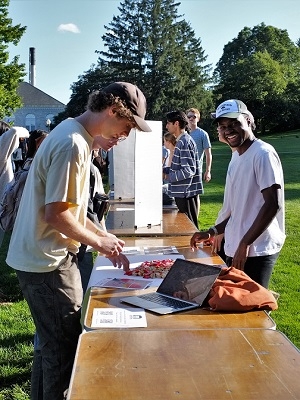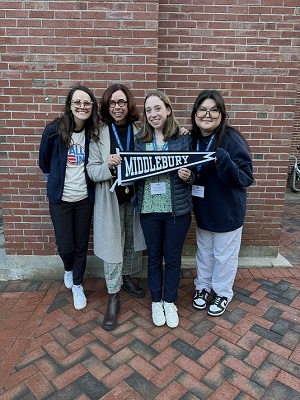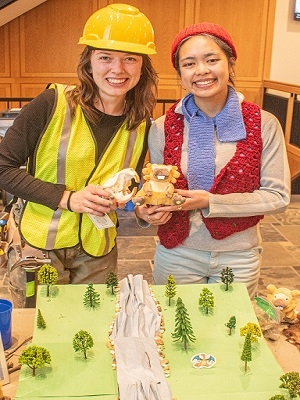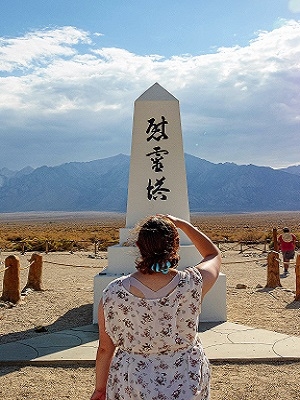2024-27 Strategic Plan
The CCE’s three-year, strategic plan was drafted during the 2023-2024 academic year to identify priority goals and focus our work. The plan was created in collaboration with campus partners, students, faculty, and external community partners.
Scroll down to the bottom to read about our strategic plan accomplishments from the 2024-2025 academic year!
Mission
The Center for Community Engagement prepares students for lives of meaning and impact through partnerships with local, domestic, and global communities. Our experiential learning programs work to strengthen communities and contribute to the public good.
Vision
We envision a just and inclusive society where college and community partners collaborate to build and sustain thriving communities.
Values
-
Justice: We value actions that honor the inherent worth and dignity of each person.
-
Connection: We value collaborative relationships, the effort required to sustain them, and the process of imagining and building shared visions.
- Learning: We value the cultivation of lifelong curiosity about ourselves, others, our communities, and our world.
Commitments
We commit to practicing our values across our work—as a Center for Community Engagement team, in our relationships, and as individuals.
Justice practices: We center inclusion, access, and equity across our work by seeking out, engaging with, and uplifting diverse viewpoints and experiences. We recognize and nurture the potential of individuals and communities. We foster critical awareness of ourselves, systemic power dynamics, and the potential to inadvertently perpetuate harm. We consider conflict an opportunity for constructive change.
Connection practices: We cultivate humility, openness, and empathy to build sturdy relationships. We create and join spaces that elicit, honor, and foster a variety of perspectives. We make decisions collaboratively and work to ensure our partnerships with communities are reciprocally beneficial. We are transparent with our intentions.
Learning practices: We embrace curiosity, continuously learning from others. We listen, reflect, share our perspectives, and are open to change. We ground our practices in evidence and experience. We recognize there are multiple ways of knowing, doing, and being, and this gives us the courage to approach our work with creativity, wonder, and playfulness.
Learning Outcomes
Across our work, we support student learning in three areas:
-
Cultivate Students’ Civic Knowledge: What systems and structures do students need to understand to work effectively in your communities? CCE experiences forge meaningful relationships that complicate assumptions and inspire students to want to expand their understanding of complex social systems and how social change works.
-
Build Students’ Civic Skills: What practices and abilities help students collaborate with others in ethical ways? Community connected learning experiences allow students to develop and hone skills that allow them to contribute effectively with others— like how to enter diverse communities respectfully, facilitate groups effectively, and get things done in teams that include people with diverse backgrounds and perspectives.
-
Strengthen Students’ Civic Identities: Who are students in their local and global communities? How will they engage? Ultimately, these experiences spark students’ commitment to be contributors in our world going forward. Instead of waiting for an ideal world, they know that taking action— imperfectly in the here and now— is how we function as a democracy and design a more just world.
Strategic Goals and Objectives
Four strategic areas outline our key objectives and the actions needed to meet these objectives. The strategic areas identified include: Access and Partnerships, Civic Leadership Development, Academic Integration, and Intercultural and Global Learning. These are explained in further detail below.
Access and Partnerships

We support students to explore their established and emerging interests through hands-on community engagement. We help students build relationships and find ongoing commitments that align with their values. We also provide multiple entry points for sustainable collaborative relationships with community partners and faculty.
Goal: Increased transparency and visibility for how to enter into community-engaged learning relationships for community partners, faculty, and students.
Objectives
- Create accessible maps with key pathways for engagement among different stakeholders.
- Launch plan for sharing maps with opportunities for all audiences.
- Understand and map CCE networks to identify engagement/communication opportunities.
Supporting Programs
Civic Leadership Development

Our co-curricular programs foster students’ team leadership skills, promote long-term relationships with their community members and peers, and address social issues like migrant justice, nutrition access, democratic engagement, and youth development.
Goal: A thriving civic learning ecosystem with scaffolded pathways to develop collaboration skills, maintain long-term community relationships, and address social issues.
Objectives
- Design and roll out a Civic Leader Certificate program.
- Cross-pollinate knowledge, leverage resources, and encourage collaboration among student leaders, community partners, and campus partners to support common goals.
Supporting Programs
- Community Engagement Organizations
- Democracy Initiatives
- Language in Motion
- Middlebury Alternative Break Trips (MAlt)
- Community Friends
- Public Service Leadership Awards
- Newman Civic Fellowship
Academic Integration

We allow students to directly connect theory to reality with hands-on practice. We also coach and support faculty to incorporate community-connected pedagogies into their teaching and research.
Goal: Emerging integration of community-engaged programs into academic systems across the Middlebury institution.
Objectives
- Create a standard identifying element marking community-connected learning courses in the course catalog.
- Explore, assess, and integrate communities of practice for students.
- Explore, assess, and integrate communities of practice for faculty.
Supporting Programs
- Community-Connected Learning Course
- Privilege & Poverty Academic Cluster
- Half-Credit Experiential Gateway and Capstone Courses
- Academic Outreach Endowment Grants
Intercultural and Global Learning

We provide year-round opportunities for undergraduate, graduate, and study-away students to work and learn with communities diverse in culture, language, and experience. Students develop their global curiosity and knowledge, cultural humility, and the skills of conflict transformation.
Goal: Established global partnerships with shared learning objectives and collaborative procedures that are both consistent and flexible.
Objectives
- Assess and align learning objectives across programs.
- Assess, align, and articulate program processes, ensuring alignment with values and learning outcomes.
- Share learning outcomes and program processes with new and established partners, and assess/develop collaborative procedures with those partners.
Supporting Programs
Accomplishments
These accomplishments are from the CCE’s 2024-2025 academic year. We’re excited to share what we’ve been up to!
Academic Community Connections:
- We gained faculty commitment to intentionally identify community based learning courses in the course catalogue.
Access and Partnerships:
- We developed new “Pathways to Connect” resources for community partners and students to help guide them through the different avenues to engage.
- We redesigned our website to help students, faculty, and community partners navigate the wide range of opportunities available (new website launching late August 2025).
Civic Leadership Development:
- We laid the groundwork to develop our new Civic Leadership Certificate program, with a pilot program planned for Fall 2026.
Intercultural and Global Learning:
- We identified areas of learning objective alignment and divergence across our variety of programs, and clarified and revised our learning objectives as needed.

